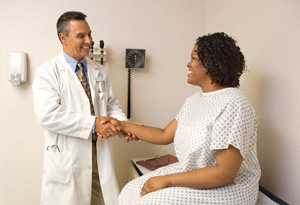Are you left with unanswered questions and worry you're not getting a full exam from your healthcare provider? Your doctors should welcome your input. These 19 questions and talking points can ensure your best visit yet.

Primary Care Physician Checklist
Be prepared for your next primary care physician checkup with this checklist:
- Blood Pressure
Ask what it is and what it should be.
- Family History
Discuss when you should be tested for diseases that have affected family members.
- Blood tests
Starting between ages 35 and 40, you should have your cholesterol and blood-sugar levels checked to screen for heart disease and diabetes. Ask ahead if you need to make preparations, such as fasting before the test.
- Thyroid Function
Women should have their thyroid tested every five years after menopause. You also should be tested if you have unexplained weight loss, irritability, irregular heart rate, insomnia or muscle weakness (all symptoms of an overactive thyroid), or fatigue, depression, weight gain, dry skin or trouble concentrating (all signs of an underactive thyroid).
- Bone Mineral Density (BMD)
You should have a BMD test at age 65 (sooner if you are postmenopausal and have risk factors: for instance, you're thin or small boned, or you smoke or have a family history).
- Prescriptions
Tell your doctor about any other drugs, herbs or supplements you're taking.
- Unusual Symptoms
Describe anything abnormal—a rash, headaches, sadness, sudden weight gain or loss, fatigue.
Next: Gynecologist Checklist
Gynecologist Checklist
Be prepared for your next visit to the gynecologist with this checklist:
- Contraception
Ask whether you're using the right form for you. For example, the pill might not be the best option if you smoke, are physically inactive, and are over 35.
- Sexually Transmitted Diseases (STDs)
Testing for STDs is not part of the Pap smear; ask your doctor which STDs (HIV, chlamydia, or gonorrhea, for example) you should be screened for.
- Mammograms
You should get one annually, starting at age 40 (earlier if you have a family history of breast cancer).
- Pap Smear
Ask for the new ThinPrep test, which more accurately shows cell abnormalities. Your doctor takes the sample the usual way, then dips it into a solution that breaks down the mucus, blood and inflammation that can make it hard to see the cervical cells.
- Human Papillomavirus (HPV)
New guidelines suggest that if your results are inconclusively abnormal (called ASC-US), you should be tested for HPV strains that can cause cervical cancer.
- Fibroids
Tell your doctor if you've had heavier or more-painful-than-usual periods, which may be a sign of fibroids.
- The Rest of the Exam
Your visit should include a pelvic and rectal exam to check for signs of vaginal infections, uterine fibroids, STDs or ovarian cysts.
Next: Dentist Checklist
Dentist Checklist
Be prepared for your next visit to the dentist with this checklist:
- X-rays
Patients should get a complete set of X-rays every three to five years. During regular checkups—which should be scheduled every six months to a year—X-rays should be taken of individual teeth that may have cracks or cavities. Pregnant women should not have X-rays.
- Temporomandibular Joint (TMJ) Syndrome
Clenching, grinding, or bad alignment of teeth can cause this disorder. Even if you don't notice symptoms (headaches, jaw pain), your dentist should look at your bite and feel your jaw to ensure there is no stress to the joints.
- Periodontal Exam
Have your gums receded? Your dentist should take measurements annually around each tooth to detect any gum disease.
- Oral Cancer
The inside of your mouth and the glands in your neck area should be checked each year.
- Oral Surgery
Anytime you receive general anesthesia, an oral surgeon, a surgical assistant and another assistant should be on hand to monitor your vital signs using an EKG, a blood pressure monitor and a pulse oximeter. Either the oral surgeon must be licensed in anesthesiology by the state dental board (the license should be displayed in the office) or there must be an anesthesiologist present.
Keep Reading
As a reminder, always consult your doctor for medical advice and treatment before starting any program.




